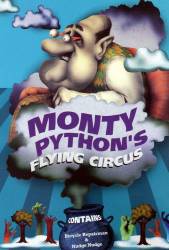Question: At a certain point there is a cut to a studio scene of a supposed current affairs programme called, (title super on screen), "PROBE AROUND" on crime. There is a stirring piece of classical music used as an intro to the supposed programme, what is it? I know it, but I simply cannot remember the composer or the work. Could you possibly tell me what it is?
Question: I'm looking for an audio version of the Buying a Bed sketch - where they have to get in a fish tank and sing Jerusalem. Does anyone know which album/CD it appears on? Thanks.
Answer: The sketch appears on their first album "Monty Python's Flying Circus" from 1970. BBC retained the rights to this album and it has not been re-released on CD as the other albums whose rights belong to the Pythons so you will probably only find it on (very used) vinyl.
Question: From the Bruces' philosophers song, what do they mean when they say "There's nothing Neecha couldn't teach ya about the raising of the wrist"?
Answer: Well, the whole song is about drinking, so it's pretty clear that "the raising of the wrist" refers to the movement made while drinking. "Neecha" is, in fact, "Nietzsche", as in Friedrich Nietzsche, a nineteenth century German philosopher. So the line's suggesting that Nietzsche was a heavy drinker - that there was nothing that he didn't know about it.
Question: In the late part of the show, the reporter is interviewing the Piranha brothers' former schoolmaster, but their conversation is deliberately inaudible. Can any lip readers out there tell what they're saying, presumably improvised dialogue?
Answer: Other than the teacher asking "I'm sorry?" at one point, it's complete gibberish.
Question: In the courtroom scene, the first question Eric Idle asks Michael Palin is "You live at 46 Horton Terrace?", to which Palin replies in the affirmative. A few questions later, Idle says "You did say 46 Horton Terrace?", Palin says he did, and Idle says "Got him.", he bangs a small gong, and the courtroom (and the studio audience) laughs uproariously and applaudes. I do not get the joke here. The address is the same in both questions. I have watched this scene many many times and am still at a loss. Can someone help me?
Answer: Eric Idle bangs the gong because Michael Palin said 'Yes' - They're playing the 'yes-no' game, where the idea is to answer questions without using the words yes or no. At the time there was a quiz show called Take Your Pick, the first round of which was the 'yes-no' game - contestants had to answer questions for 60 seconds to pass through to the next round.
Oh, You're No Fun Anymore - S1-E7
Question: In this episode, the first man to be changed into a Scotsman is named Harold Potter. Is this an inspiration for the name of Harry Potter?
Answer: No, it's just coincidence. J K Rowling took the surname from Ian Potter, a childhood friend, and she simply picked a first name that she liked.
Question: I was told that all songs in the Monty Python series/movies were written and composed by either Eric Idle or Neil MacInnes. Is this true? If not, who else wrote or co-wrote songs?
Answer: "The Lumberjack Song" and "Spam" were written by Terry Jones and Michael Palin. "If I Were Not in the C.I.D." was written primarily by John Cleese. Other than those, and "Jerusalem," all songs for visual media were written by Eric Idle and Neil Innes (not MacInnes). Mind you, they all wrote more songs that appear on the albums.
Question: I know that Monty Python usually played female roles themselves, but they had actors such as Carol Cleveland to fill roles when necessary. My question is, aside from Ms. Cleveland, who else, if anyone, played a recurring role as "extra"? I hope that makes sense.
Answer: Ian Davidson, Connie Booth and Lyn "Mrs. Idle" Ashley appeared quite often, as did the Fred Tomlinson Singers (whenever a male chorus was required).
Question: Is there any significance behind the song "England's Mountains Green" (or whatever it's called)? It seems to be the only song anyone ever sings, outside of sketch-specific songs (like the Lumberjack Song).
Chosen answer: The song you talk of was originally a poem by William Blake called 'Jerusalem'. It speaks of the possibility of Jesus having visited England. The poem has four verses but you only ever hear the Monty Python boys sing the first one which goes, "And did those feet in ancient time/Walk upon England's mountains green/And was the holy Lamb of God/On England's pleasant pastures seen?" If there's any sort of in-joke connected to it's use, I'm not aware of it. It seemed to just be the standard song/hymn they used when a song was needed that wasn't sketch specific. Some of the sketches it appeared in were 'Salvation Fuzz/Church Police', 'Buying a Bed' and 'The Art Gallery Sketch'. Something that may be relevant, though, is that the only one who was present every time it was sung was Eric Idle. Perhaps he just liked it?
Question: Does anyone know who played the knight that hit people over the head with a dead chicken?
Chosen answer: That would be Terry Gilliam, who played a lot of non-speaking roles in the series, and some speaking ones like Cardinal Fang in 'The Spanish Inquisition.' He did all the animation as well, but I'm sure you knew that.
Question: Does anyone know what the killer joke (German version anyway) translates to in English? I tried running it through BabelFish, but it still made no sense.
Chosen answer: Fortunately for the entire English speaking world, there is no translation. It is not real German.






Answer: It is the second short-lived theme to the BBC's Panorama programme, itself taken from Rachmaninoff's Symphony No. 1.
Neil Jones